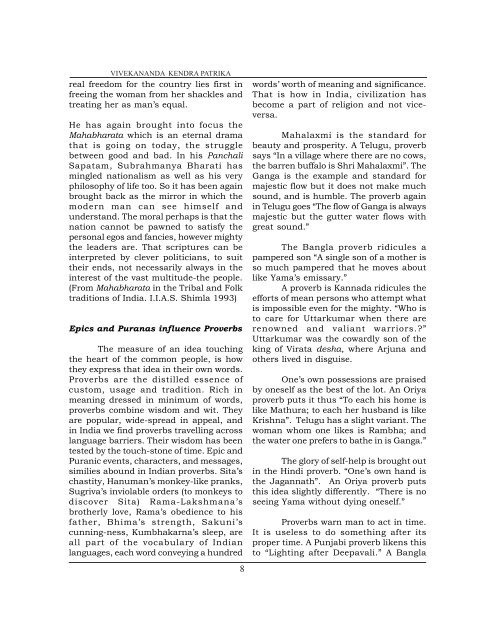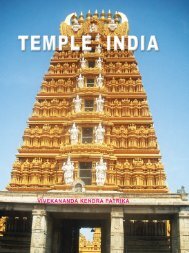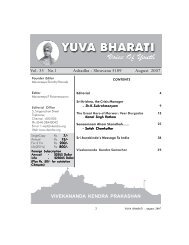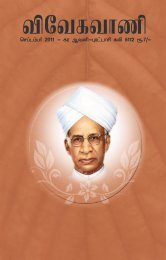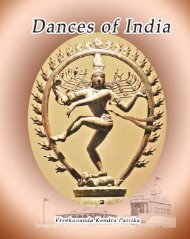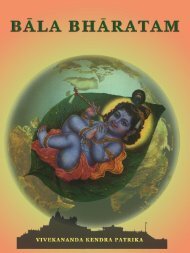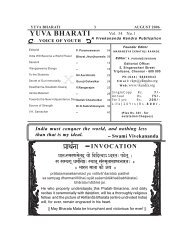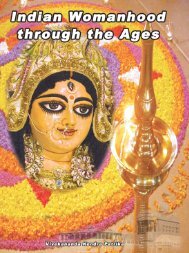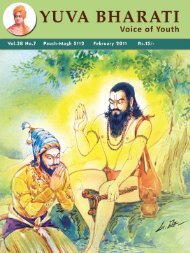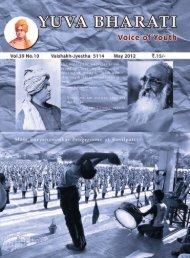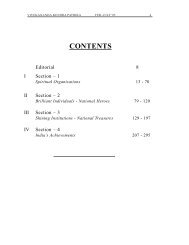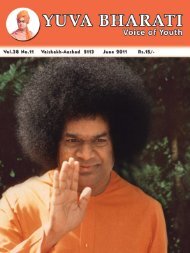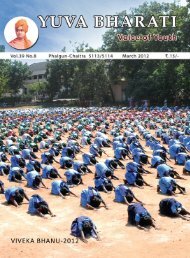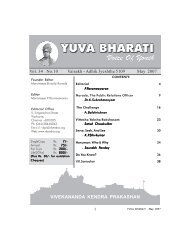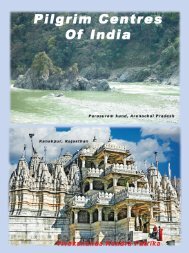Epics in Imprints-1.pdf - Vivekananda Kendra Prakashan
Epics in Imprints-1.pdf - Vivekananda Kendra Prakashan
Epics in Imprints-1.pdf - Vivekananda Kendra Prakashan
You also want an ePaper? Increase the reach of your titles
YUMPU automatically turns print PDFs into web optimized ePapers that Google loves.
VIVEKANANDA KENDRA PATRIKA<br />
real freedom for the country lies first <strong>in</strong><br />
free<strong>in</strong>g the woman from her shackles and<br />
treat<strong>in</strong>g her as man’s equal.<br />
He has aga<strong>in</strong> brought <strong>in</strong>to focus the<br />
Mahabharata which is an eternal drama<br />
that is go<strong>in</strong>g on today, the struggle<br />
between good and bad. In his Panchali<br />
Sapatam, Subrahmanya Bharati has<br />
m<strong>in</strong>gled nationalism as well as his very<br />
philosophy of life too. So it has been aga<strong>in</strong><br />
brought back as the mirror <strong>in</strong> which the<br />
modern man can see himself and<br />
understand. The moral perhaps is that the<br />
nation cannot be pawned to satisfy the<br />
personal egos and fancies, however mighty<br />
the leaders are. That scriptures can be<br />
<strong>in</strong>terpreted by clever politicians, to suit<br />
their ends, not necessarily always <strong>in</strong> the<br />
<strong>in</strong>terest of the vast multitude-the people.<br />
(From Mahabharata <strong>in</strong> the Tribal and Folk<br />
traditions of India. I.I.A.S. Shimla 1993)<br />
<strong>Epics</strong> and Puranas <strong>in</strong>fluence Proverbs<br />
The measure of an idea touch<strong>in</strong>g<br />
the heart of the common people, is how<br />
they express that idea <strong>in</strong> their own words.<br />
Proverbs are the distilled essence of<br />
custom, usage and tradition. Rich <strong>in</strong><br />
mean<strong>in</strong>g dressed <strong>in</strong> m<strong>in</strong>imum of words,<br />
proverbs comb<strong>in</strong>e wisdom and wit. They<br />
are popular, wide-spread <strong>in</strong> appeal, and<br />
<strong>in</strong> India we f<strong>in</strong>d proverbs travell<strong>in</strong>g across<br />
language barriers. Their wisdom has been<br />
tested by the touch-stone of time. Epic and<br />
Puranic events, characters, and messages,<br />
similies abound <strong>in</strong> Indian proverbs. Sita’s<br />
chastity, Hanuman’s monkey-like pranks,<br />
Sugriva’s <strong>in</strong>violable orders (to monkeys to<br />
discover Sita) Rama-Lakshmana’s<br />
brotherly love, Rama’s obedience to his<br />
father, Bhima’s strength, Sakuni’s<br />
cunn<strong>in</strong>g-ness, Kumbhakarna’s sleep, are<br />
all part of the vocabulary of Indian<br />
languages, each word convey<strong>in</strong>g a hundred<br />
8<br />
words’ worth of mean<strong>in</strong>g and significance.<br />
That is how <strong>in</strong> India, civilization has<br />
become a part of religion and not viceversa.<br />
Mahalaxmi is the standard for<br />
beauty and prosperity. A Telugu, proverb<br />
says “In a village where there are no cows,<br />
the barren buffalo is Shri Mahalaxmi”. The<br />
Ganga is the example and standard for<br />
majestic flow but it does not make much<br />
sound, and is humble. The proverb aga<strong>in</strong><br />
<strong>in</strong> Telugu goes “The flow of Ganga is always<br />
majestic but the gutter water flows with<br />
great sound.”<br />
The Bangla proverb ridicules a<br />
pampered son “A s<strong>in</strong>gle son of a mother is<br />
so much pampered that he moves about<br />
like Yama’s emissary.”<br />
A proverb is Kannada ridicules the<br />
efforts of mean persons who attempt what<br />
is impossible even for the mighty. “Who is<br />
to care for Uttarkumar when there are<br />
renowned and valiant warriors.?”<br />
Uttarkumar was the cowardly son of the<br />
k<strong>in</strong>g of Virata desha, where Arjuna and<br />
others lived <strong>in</strong> disguise.<br />
One’s own possessions are praised<br />
by oneself as the best of the lot. An Oriya<br />
proverb puts it thus “To each his home is<br />
like Mathura; to each her husband is like<br />
Krishna”. Telugu has a slight variant. The<br />
woman whom one likes is Rambha; and<br />
the water one prefers to bathe <strong>in</strong> is Ganga.”<br />
The glory of self-help is brought out<br />
<strong>in</strong> the H<strong>in</strong>di proverb. “One’s own hand is<br />
the Jagannath”. An Oriya proverb puts<br />
this idea slightly differently. “There is no<br />
see<strong>in</strong>g Yama without dy<strong>in</strong>g oneself.”<br />
Proverbs warn man to act <strong>in</strong> time.<br />
It is useless to do someth<strong>in</strong>g after its<br />
proper time. A Punjabi proverb likens this<br />
to “Light<strong>in</strong>g after Deepavali.” A Bangla


